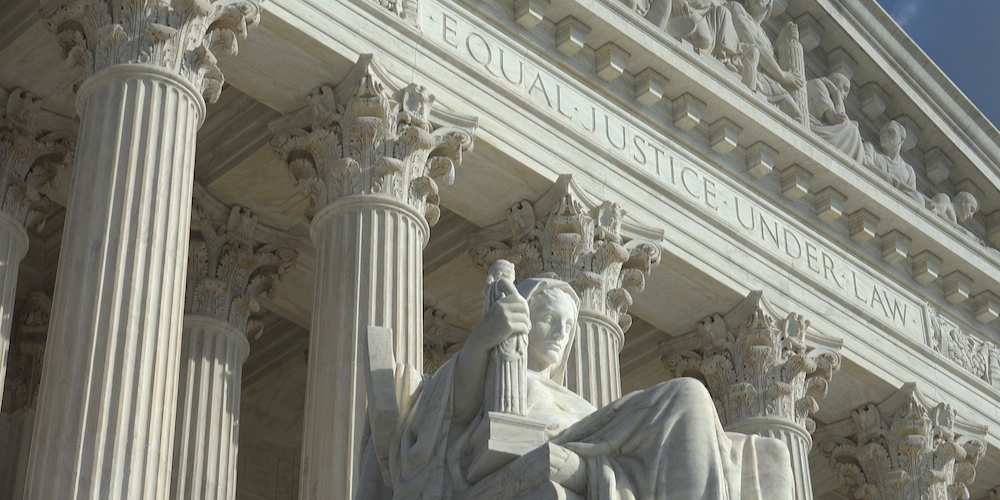
The man fighting for federal benefits as a U.S. citizen of Puerto Rico said in a brief filed with the Supreme Court on Monday that the Justice Department’s bid to deny him those benefits based solely on where he lives is unconstitutional and represents a dangerous continuation of the racist “separate and unequal” doctrine of the Insular Cases.
You can download the brief here: Vaello Madero, Respondent Brief
Jose Luis Vaello Madero began receiving Supplemental Security Income benefits in 2012 as a resident of New York State. He continued to receive the payments when he moved home to Puerto Rico in 2013 until 2016, when the Social Security Administration said it was revoking his benefits retroactively to the date he established residency on the island because he was “outside the United States.”
In 2017 the DOJ filed a lawsuit invoking a criminal statute against Vaello Madero – with the threat of up to five years in jail – to recover the $28,081 in SSI benefits he received while in Puerto Rico.
The DOJ lost its case in the District Court of Puerto Rico, and again on appeal to the U.S. Court of Appeals for the First Circuit in April 2020. It then appealed to the Supreme Court, which granted review of the case in March.
The DOJ argued in its brief before the Supreme Court in June that while Congress has the power to extend SSI benefits to U.S. citizens residing in overseas territories, not doing so does not violate the Constitution because Puerto Rico’s “unique” status benefits its residents because they pay less in federal taxes and therefore can take care of their own.
In making its case, the DOJ relied on a series of Supreme Court decisions from the turn of the last century. Known collectively as the Insular Cases, they established a legal doctrine of “separate and unequal” status for U.S. citizens of overseas territories founded on the theory that their inhabitants belonged to “uncivilized” and “alien races” who were “unfit” to handle the full rights and duties of citizenship.
The legal team at Curtis, Mallet-Prevost, Colt & Mosle LLP that is representing Vaello Madero pro bono argued in their 63-page response on Monday that the DOJ’s justification for denying the SSI benefits is not only “wildly out of touch with Puerto Rico’s political and fiscal reality, but it also fails to explain why poor and disabled Americans in Puerto Rico must carry this burden while similarly situated Americans in the most autonomous jurisdictions in our federated system, states, are not required to make this sacrifice.”
The DOJ’s argument is facile at its core because SSI beneficiaries do not earn enough money to pay federal taxes, it is not a self-funded program like Social Security, and the poorest to the richest states receive support as well as the Northern Mariana Islands, which has similar tax exemptions to Puerto Rico, the lawyers said.
“Indeed, that is how SSI works. SSI is a national poverty relief program designed to provide a minimum standard of support for the country as a whole. It is not designed to place the burden of caring for the aged and disabled on the jurisdictions where they reside. Nor does it condition this national support on local contributions. By enacting SSI, Congress relieved localities of that burden and opted to use national resources to take care of the neediest Americans equally, regardless of how much their local neighbors contribute to the Treasury,” the lawyers said.
“While certain federal insurance programs are funded by their beneficiaries, SSI is not. It is irrelevant to SSI eligibility whether an individual resides in New York and pays federal income tax before moving to Puerto Rico (like respondent), or whether they live in Puerto Rico before moving to New York to receive SSI,” they said.
The disparity is such that Puerto Rico receives some $36 million in federal support under adult assistance programs such as Aid to the Aged, Blind and Disabled, where upwards of $2 billion would be available under SSI, raising grave equal protection concerns, Vaello Madero’s lawyers said.
“The exclusion of Puerto Rico from SSI is thus not a matter of respecting autonomy, but of arbitrary neglect,” the brief states.
Noting that Puerto Rico has been subject to U.S. control for more than 120 years, but its citizens lack federal voting power and the political power to set their own destiny, Vaello Madero’s lawyers wrote in their brief, “Congress’s decision to exclude Puerto Rico from SSI solely on the premise that it is ‘outside the United States’ can be traced directly to a historical desire to single out the people of Puerto Rico for lesser treatment because of their mixed race and Hispanic ancestry.”
Reversing the First Circuit’s decision “would be a reaffirmation of the Insular Cases’ foundational premise that the Constitution recognizes two ‘United States,’ one in which indigent and disabled citizens and non-citizens are guaranteed a minimum standard under national welfare laws and another in which similarly situated U.S. citizens who have experienced a history of discrimination can be denied the bare minimum without any voting power to change this,” said Vaello Madero’s legal team.
“It is time to put an end to that injustice,” they wrote.

The case has drawn wide attention, including from President Joe Biden, who issued an unusual statement just prior to the DOJ filing its brief in June, voicing his disagreement with the provision in the Social Security Act that denies U.S. citizens of overseas territories access to SSI.
“This provision is inconsistent with my administration’s policies and values,” Biden said. Stating that “there can be no second-class citizens in the United States of America,” he called on Congress to amend the Social Security Act and said his administration would work with lawmakers to do so. While the U.S. House of Representatives, prompted by V.I. Delegate Stacey Plaskett, is currently considering a resolution that condemns any continued reliance on the Insular Cases, Biden and the DOJ have yet to make their position known.

Neil Weare, president and founder of Equally American, which supports equality for the 3.5 million citizens living in U.S. territories – 98 percent of whom are racial or ethnic minorities – said he and a number of other national civil rights organizations plan to file amicus briefs in support of Vaello Madero in the coming weeks.
“Mr. Vaello Madero makes a compelling case that the continuing denial of SSI in Puerto Rico and other territories simply cannot be squared with the Constitution’s guarantee of equal protection,” Weare said in a statement. “This historic case will once again provide the Supreme Court the choice to either turn the page on continued discrimination against citizens in the territories who remain politically disenfranchised or continue the dark legacy of the Insular Cases.”
The United States has until Sept. 29 to reply to Vaello Madero and the scores of amicus briefs expected in the case. Oral argument is not yet scheduled but will likely be in December or January, said Weare.
All the case filings in Vaello Madero, along with other resources, are available online. There is also a Spanish-language page.


